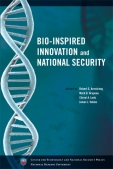Био-инновации и вопросы национальной безопасности. Исследование Университета национальной безопасности США
|
|
• New Biological Advances and Military Medical Ethics And other issues
Ever since man took to the battlefield, biology has played a significant role—both unintentionally and intentionally—in conflict. Prior to the discovery of the germ theory of disease, most combat deaths were the result of infections. And even before that understanding, biology was used in an offensive role. An early example was the Tatars' hurling of plague victims' bodies over the wall of the Crimean city of Kaffa in 1346, which probably helped spread the Black Death. Despite various treaties and protocols, offensive biological weapons use has continued to this day, with the anthrax attacks of 2001 being the most recent incident. Such activity has led to a strong defensive program, with medical science developing numerous countermeasures that have benefited both civilian and military populations. But that is the "old" biological warfare. Covert programs for the development of novel weapons will advance; likewise, the development of countermeasures will also continue. The present volume, however, does not address these issues. Rather, it reviews and analyzes current research and likely future developments in the life sciences and how they will significantly influence the biological material available to warfighters—not as weapons systems, but as augmentation to currently available equipment. This is the "new" face of biological warfare. The editors of this volume have assembled experts in research, warfighting, and defense policy to describe biological applications from the smallest to the largest scale. In addition, they show how thinking in biological terms can improve our procurement cycle and enhance our development time and costs. Finally, no description of biotechnology would be completewithout a consideration of ethical and legal issues related to such research and development. This edited book is an important contribution to the literature and nicely captures a number of ongoing military basic science research projects with long-term implications for the Department of Defense. It does not purport to be an exhaustive accounting, but it is an excellent introduction for policymakers to garner an understanding of where biology is going to fit into 21st-century readiness and preparedness for our fighting force.
• Bioenergy: Renewable Liquid Fuels.Michael Ladisch • Bioenzymes and Defense. Adrienne Huston • Bio-inspired Materials and Operations. Erica R. Valdes • Bio-inspired Network Science. Joгo Hespanha and Francis Doyle III • Biological Automata and National Security. Yaakov Benenson • Biological Warfare: A Warfighting Perspective. John B. Alexander • Biomechanically Inspired Robotics. John Socha and Justin Grubich • Biomimetic, Sociable Robots for Human-Robot Interaction. Eleanore Edson, Judith Lytle, and Thomas McKenna • Biosensors and Bioelectronics. DimitraStratis-Cullum and James Sumner • Biotech Impact on the Warfighter. Thomas X. Hammes • Building the Nonmedical Bio Workforce for 2040. Timothy Coffey and Joel Schnur • Enhanced Human Performance and Metabolic Engineering. James J. Valdes and James P. Chambers • Ethics and the Biologized Battlefield: Moral Issues in 21st-century Conflict. William D. Casebeer • Forging Stress Resilience: Building Psychological Hardiness. Paul Bartone • Functional Neuroimaging in Defense Policy. Richard Genik III, Christopher Green, and David C. Peters II • Learning Unmanned Vehicle Control from Echolocating Bats.Eric W. Justh • Legal Issues Affecting Biotechnology. Joseph Rutigliano, Jr. • Neuroplasticity, Mind Fitness, and Military Effectiveness. Elizabeth Stanley • Neurorobotics: Neurobiologically Inspired Robots. Jeffrey Krichmar, Roy G. Thompson, and James P. Chambers • New Biological Advances and Military Medical Ethics. Edmund G. Howe • The Life Sciences, Security, and the Challengeof Biological Weapons. Michael Moodie
|
| 07 декабря 2011 | Рубрика: Интелрос » Библиотека журнала "ИНТЕЛРОС" » Bio-inspired innovation and national security |


